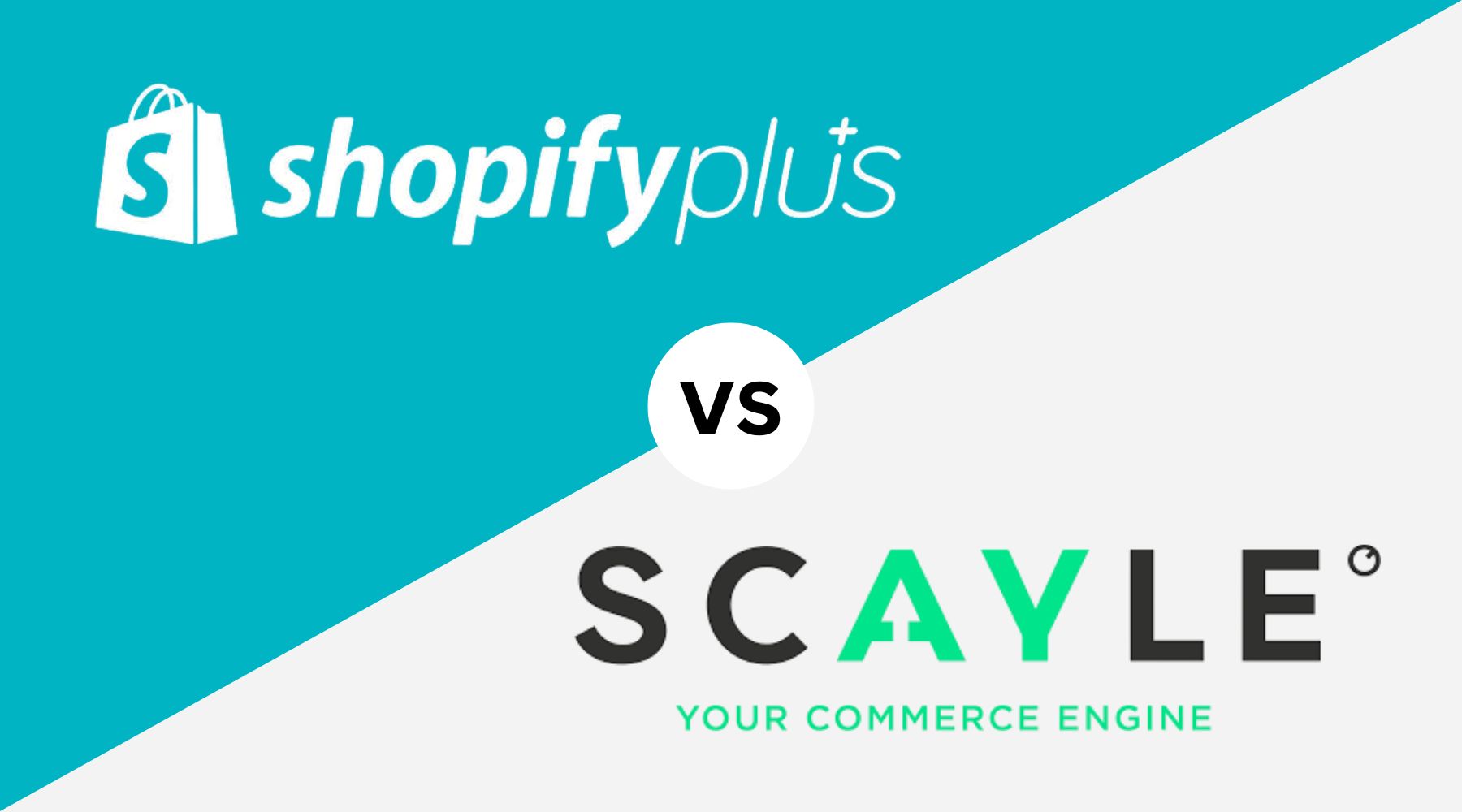Growing brands with digital ambitions sooner or later face a decisive question: which platform will support the business as it scales technically, strategically, and economically? Two solutions that are frequently mentioned in this context are Scayle and Shopify Plus.
Both provide an infrastructure that goes far beyond a traditional modular system. However, the requirements for flexibility, international expansion, and process integration differ significantly depending on the business model.
While Scayle is particularly strong in modular enterprise commerce and integrates well into existing ERP structures, Shopify Plus stands out with a well-designed ecosystem and high ease of use. This is especially true for brands that rely on short time-to-market cycles and want to expand into new markets quickly.
By working with an experienced Shopify Plus Agency, you can set up many processes efficiently from the start and unlock the full potential of the platform.
In this article, we compare both systems across key evaluation criteria, from pricing structure and scalability to SEO tools and checkout functionalities. This will help you make an informed decision about which platform is better suited to your business model.
Scayle vs Shopify Plus: direct comparison at a glance
| Key Features | Scayle | Shopify Plus |
| Free trial period | ❌ | ✅ |
| 24/7 Support | ✅ (with SLA) | ✅ (from launch plan) |
| Online & offline sales | ✅ | ✅ |
| Capital support for traders | ❌ | ✅ |
| Own domain | ✅ | ✅ |
| SEO features | ✅ (technically strong) | ✅ (app-supported) |
| Hosting included | ✅ | ✅ |
| Sell internationally | ✅ | ✅ |
| Multi-currency capability | ✅ | ✅ |
| Mobile optimized | ✅ | ✅ |
| Fraud protection | ✅ (retrofittable) | ✅ (integrated) |
| Integrated checkout | ✅ | ✅ |
| Fulfillment network | ❌ (individual) | ✅ |
| Email marketing tools | ❌ (via integration) | ✅ (Email) |
| App Store / Marketplace | ❌ | ✅ (6,000+ apps) |
| Mobile app for retailers | ❌ | ✅ |
This overview gives you an initial sense of which features come standard with each platform and where you may need to expect additional costs or workarounds. In the following sections, we take a closer look at the differences and strengths in detail.

Scayle vs Shopify Plus: ten comparison points
1. Who are the platforms designed for?
Both platforms target companies with ambitious growth goals, but their audiences differ significantly in the details. Scayle is particularly appealing to large retailers and brands that want to continue using their existing infrastructure, such as ERP, PIM, or CRM systems, and tightly connect their commerce setup to established processes.
The modular headless approach makes it possible to build highly individual commerce structures, although it requires corresponding development capacity and technical oversight.
Shopify Plus, on the other hand, is frequently used by direct to consumer brands, digital businesses, and internationally scaling start ups. The platform is ideal for teams that want to launch without a complex IT setup but still need a high performance system with room to grow.
With its short time to market, intuitive interface, and broad ecosystem, many scenarios can be implemented without a development team.
If you are currently deciding between Shopify Plus and Magento, our comparison of these two systems can also help you make the right decision, especially regarding maintenance effort and extensibility.
2. Pricing models & cost overview
When you introduce an enterprise platform, you want to understand not only what it can do but also what it costs. This is where Scayle and Shopify Plus differ fundamentally.
- Scayle calculates pricing individually. Monthly costs depend on revenue, transaction volume, number of users, and the modules selected. Many features are optional and generate additional charges, including integrations and frontend hosting. True transparency usually comes only through direct discussions with the provider.
- Shopify Plus offers a clearer pricing model. The monthly base fee starts at around 2,000 US dollars depending on revenue level. Most core features such as hosting, checkout, security, support, themes, and APIs are included. Additional costs typically arise from apps, payment fees, or custom extensions.
For teams that want cost control and predictable scalability, this level of planning reliability is an advantage. When working with an experienced Shopify Plus consulting agency, the setup can be designed to avoid unnecessary add ons and ensure that the infrastructure aligns with the business model.
3. Setup experience & time to market
- The difference becomes clear right from the start. Scayle typically requires an extensive technical onboarding process. The platform is designed for companies with internal IT resources or external development teams that plan their project setup in detail. Time to market usually spans several months.
- Shopify Plus stands out with its speed. Thanks to numerous templates, built-in checkout logic, and seamless app integrations, brands can often launch their store within a few weeks, even with more complex requirements. Those who work with an experienced Shopify Plus Development Services Agentur can often shorten setup time even further while ensuring a scalable foundation.
Shopify Plus is often the first choice for brands aiming to test, launch, and grow quickly.
4. Scalability & performance
Both platforms provide enterprise-level performance, although their approaches and prerequisites differ.
Scayle is well suited for companies operating multiple brands, languages, and countries. Its multi-store architecture is designed from the ground up to manage complex catalogs and regional variations through a central backend. The headless structure also allows the frontend to be customized to target international audiences precisely.
Shopify Plus also supports multi-store functionality through separate storefronts that can be managed from a unified admin. Performance remains strong even under heavy traffic, such as during product drops or flash sales. The provider guarantees 99.9 percent uptime and relies on globally distributed servers.
If you aim to scale globally while relying on a stable infrastructure, you can benefit from the support of a Shopify Plus Development Agency that guides the technical and strategic rollout into new markets.

5. Architecture & developer flexibility
Technically experienced companies place great importance on a flexible system architecture. Scayle follows an API first approach and positions itself deliberately as a headless solution with composable commerce capabilities. Developers can fully decouple the frontend and backend, integrate microservices, and tailor the entire infrastructure to their needs.
Shopify Plus, by contrast, is built with an app first mindset. It offers a well structured API layer but provides less deep system access than Scayle. The platform supports headless commerce through the Storefront API and enables custom enhancements with Shopify Functions and metafields.
Some system areas remain more restricted, such as checkout or cart logic, which can pose limitations for certain enterprise setups.
For teams seeking maximum developer freedom, Scayle is the more open solution. For those who prefer a stable framework with a proven app ecosystem, Shopify Plus is often the better fit, especially when evaluating Shopify Advanced vs Shopify Plus.
6. Checkout & conversion features
The checkout experience directly influences revenue, which makes it worth examining closely. Both platforms offer optimization options but with differing focal points.
- Shopify Plus relies on a checkout process that has proven itself globally and performs especially well in mobile commerce. With Functions, enterprise merchants can customize discounts, shipping rules, and payment options. Load times are excellent, and UX design can be adapted to the brand’s identity through themes and custom code.
- Scayle offers a more flexible checkout that can be implemented fully headless. Companies with their own frontend development have complete freedom, including custom funnel logic.
Important functions compared:
- Mobile optimization: Both platforms support mobile checkout solutions, though Shopify Plus maintains an edge due to its long standing focus on mobile commerce.
- A/B testing & personalization: Available via external tools in Scayle, and via apps such as Convert or Kameleoon in Shopify Plus.
- One-click purchase & wallets : Shopify natively supports Apple Pay, Shop Pay, and more. Scayle often requires custom integrations.
For conversion driven brands with a strong focus on mobile customers, Shopify Plus can provide clear advantages in the checkout area, especially where speed, trust, and mobile payment methods are decisive.
7. B2B & DTC functionality compared
Many fast growing brands combine B2B and DTC sales, either within a single shop or across separate channels.
The question is: which platform can master both worlds effectively?
- Scayle offers a powerful B2B module with specific price lists, ordering features for business customers, and the ability to manage various customer groups within one central system. Its multi tenant capabilities are well developed, allowing companies to operate multiple brands or country instances without functional limitations.
- Shopify Plus has significantly expanded its B2B offering with the 2024 updates. Customer specific catalogs, payment terms, volume discounts, and custom checkout flows can be managed directly within the admin, without external workarounds. The major advantage lies in unified management: everything operates from a single backend, which simplifies handling DTC and B2B considerably.
For businesses looking for a system that can reliably support both models, it is also helpful to consider comparisons such as Zoey vs Shopify Plus, which can support decision making for complex sales structures.

8. Apps & integrations
The technical capabilities of a platform depend heavily on its app ecosystem and its ability to connect to third-party systems such as ERP, CRM, or fulfillment providers.
- Shopify Plus offers a significant advantage in this area. More than eight thousand vetted apps are available in the official App Store, making integrations easy to access and quick to implement. Connections to systems such as Klaviyo, Rebuy, ShipStation, or Avalara are often plug and play. Beyond that, custom apps and APIs allow companies to meet virtually any requirement, particularly when linking to more complex systems like NetSuite. Anyone comparing Shopify Plus vs NetSuite will quickly notice how seamlessly Shopify Plus integrates with commonly used ERP tools.
- Scayle, on the other hand, relies more heavily on custom integrations via API. There is no public app ecosystem, but instead a dedicated developer framework designed for tailored solutions. This is ideal for companies with their own IT teams or highly specific requirements, but less suitable for brands that depend on readily available standard solutions.
In short, businesses that prefer out-of-the-box integrations and want to scale quickly will benefit from the strong partner network and flexible plug-ins of Shopify Plus. Companies that need full control over every process step are well served with Scayle, provided they have the resources to support a more technical setup.
9. SEO & marketing features
Brands that want to scale online need more than a strong product; they need visibility. This is where commerce platforms often show clear differences.
- Shopify Plus provides a solid foundation for SEO, including clean URL structures, automatic redirects, SSL encryption, and an integrated blogging system. For structured data and advanced meta options, there are numerous apps as well as the ability to adjust code directly. International SEO is handled well through subdirectories or separate domains, including proper hreflang implementation.
- Scayle takes SEO a step further. As a headless system with its own CMS, it offers full control over site structure, performance, and technical refinements. For larger brands with multilingual content, custom link structures, or strict performance requirements, this level of flexibility is a strong advantage.
The platforms also differ in their marketing focus. Shopify Plus benefits from a broad app ecosystem for email, CRM, and retargeting, while Scayle leans more toward custom integration solutions. Anyone familiar with comparisons like BigCommerce Enterprise vs Shopify Plus will recognize that Shopify performs remarkably well in performance marketing, thanks largely to its extensive tool selection and smooth integrations.
10. Support, security and compliance
A high-performing store means little if it fails to meet legal or technical requirements. That makes it essential to examine data protection, availability, and the quality of support.
- Shopify Plus complies with all major standards, including PCI DSS for credit card payments, and supports GDPR-compliant data processing with built-in tools for data deletion and export. A major advantage is access to a dedicated point of contact, the Launch Engineer, along with structured support tiers that offer 24/7 availability.
- Scayle is likewise positioned at an enterprise level. Hosting in Germany, a scalable cloud infrastructure, and clear SLAs make it a reliable solution for brands with strict security and data protection requirements. Support is provided through dedicated account teams and project managers, although access tends to be less standardized than with Shopify Plus.
Both platforms deliver strong capabilities in this area. The deciding factor is whether you prefer a "self-service" support model with an extensive help center or a dedicated contact who knows your setup in detail.

Scayle vs Shopify Plus: our conclusion
Let’s take a final look at both platforms so you can make an informed decision for your business.
- Scayle is particularly well suited for companies that need maximum technical control, headless flexibility, and an architecture built around composability. Businesses with in-house IT teams, high customization requirements, and a need to orchestrate multiple systems seamlessly will find the right infrastructure here. Large retailers with international rollouts or complex B2B processes also benefit from Scayle’s modular design.
- Shopify Plus, on the other hand, stands out with its fast time to market, ease of use, and expansive ecosystem. For scaling D2C brands, ambitious online retailers, or companies looking to enter new markets quickly, the platform offers a powerful balance of stability and adaptability.
Put simply:
- Choose Scayle if you need technological depth, a headless architecture, and maximum control.
- Choose Shopify Plus if you want to sell quickly, securely, and at scale with a platform that works smoothly even without a dedicated development team.








